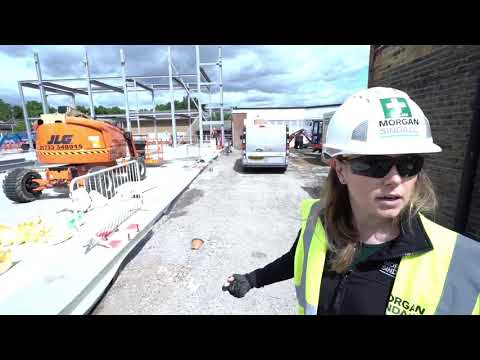Do you have an eye for technical details? Can you manage a project's moving parts while supervising staff and materials? Are you adept at working to commercial deadlines and budgets? If so, a site engineer job could be right for you.
what do site engineers do?
A site engineer’s job description will read differently depending on the project they are working on. Your duties will be very different on a housing project compared to a commercial area development, for example.
However, a site engineer’s job is generally to provide technical advice including surveying and setting out levels. You'll also manage staff on-site while sharing responsibility for security and health and safety. And working as part of a team including architects, construction managers and subcontractors, you'll ensure the completion of various parts of construction projects.
You'll typically work on construction sites one project at a time. This might range from small housing builds to multimillion-pound projects involving civil, road or rail clients.
Not been on-site before? Take a walk around a real construction site and see some of the people you could work with in our POV video.
site engineers vs site managers
When trying to find out what a site engineer is, you might see the term site manager crop up. Indeed, site engineers have similar roles to construction (site) managers, whose position is less technical.
You might have specific technical knowledge in areas such as civil, structural, mechanical or electrical engineering, for example, and will focus on tasks related to them. These areas or groups of tasks are sometimes also called packages.
Site managers on the other hand usually have broader responsibilities and are typically senior to site engineers.
what are the main construction site engineer responsibilities?
So what tasks will you be expected to perform in your day-to-day work? A typical site engineer job description often includes but is not limited to:
- offering technical advice on a construction site for subcontractors, craftspeople and operatives
- managing the site and select parts of construction projects day-to-day
- overseeing building work and ensuring the quality of the work
- setting out, levelling and surveying the site
- ensuring the plans, drawings and quantities are accurate
- supervising site security as well as health and safety
- organising and overseeing material and human resources
- managing the design documents supplied by the client
- planning work efficiently and adapting to any setbacks or difficulties to keep projects on schedule and within budget
- liaising with the local authority to ensure compliance with construction regulations and by-laws
- reporting progress and other updates back to clients
- working with subcontractors, project managers, quantity surveyors and other professionals
what is a site engineer's typical work schedule?
You'll typically work 35 to 40 hours per week in all seasons and weather conditions. Project and deadline dependent, your schedule may include some early starts and late finishes, as well as weekend shifts. Part-time work is possible but rare.
As you'll usually work on one project at a time, the site location might demand that you relocate or complete lengthy commutes for the project's duration. You'll split your time between site visits and office-based work, with office facilities often housed in temporary buildings.
You may be able to take advantage of opportunities overseas as a more experienced site engineer.
what is a typical site engineer salary in the UK?
The average annual site engineer salary in the UK is around £39,000, according to figures submitted to Glassdoor. Like any role, construction site engineer salaries vary depending on key factors such as experience and location, as well as working hours, sector and size of the employer.
You might earn in the low-to-mid-twenty thousand pounds as a graduate, for example, and then see your salary increase as you gain experience and qualifications. Senior site engineers can earn upwards of £50,000 as their base salary. Temporary or contract workers meanwhile can earn anything from £230 to £450 a day. Pay is usually higher in London.
Extras as a full-time company worker can include pension contributions, a company car, private healthcare and life insurance.
what are the key skills needed to be a site engineer?
Certain skills and attributes will help you succeed in your career as a site engineer:
- strong project management and organisational abilities
- commercial understanding of project budgets and timelines
- teamwork and communication skills, allowing you to work effectively with a range of people including clients, construction managers and subcontractors
- technical know-how
- the ability to multitask
- strong analytical and problem-solving skills
- excellent IT knowledge
- knowledge of relevant building and health and safety legislation
- a driving licence, in many cases
- a reasonable level of fitness and mobility for site inspections and tricky-to-access areas of site
how to become a site engineer
So how can you find a way into the industry? Firstly, you don't necessarily need a degree to become a site engineer. There are options for school leavers too, such as apprenticeships. But many would-be engineers choose to study civil, structural, mechanical or geotechnical engineering – or building or construction subjects – at university.
You can then gain experience through a graduate programme, which trains you for a specific role, or by applying for an entry-level position and working your way up.
how to get work experience for site engineer jobs
Whether you have a relevant degree or not, recruiters will generally favour those who have experience over those who don’t. Common routes to gaining valuable work experience are:
- years in industry as part of sandwich degree courses
- summer placements with construction companies
Both options can be useful ways of gaining an understanding of the industry, helping you see what it takes to succeed and judge whether the profession is right for you. Making a positive impression and building relationships could help you when it comes to finding work too.
- Check which construction or engineering employers offer industrial placements relevant or local to you.
what about gaining chartered status?
If you do secure a graduate role, you'll likely begin working towards a qualification with a relevant professional body. This could be one of the following, as long as your degree meets the body's criteria for membership:
- The Chartered Institute of Building (CIOB)
- The Institution of Civil Engineers (ICE)
- The Institution of Structural Engineers (IStructE)
The CIOB is considered most suitable for those in the building industry, while the latter two are better suited to engineers. Whatever the case, becoming chartered can help make you more desirable to other potential employers by demonstrating your level of expertise and commitment.
do master's degrees help?
You can find your way into site engineering without a master's degree. But having one will improve your prospects and help you get chartered too.
- Completing a master's degree shows that you have advanced knowledge and skills. It could allow you to work on larger, higher-budget and more complex projects. It might also mean you can specialise and advance in an area that interests you, such as civil engineering role.
typical employers for site engineering
The key employers of site engineers include:
- construction companies
- civil engineering companies, from small local firms to large multinationals
- public sector organisations including water, gas and electricity providers
- government and local authorities
Large construction companies often recruit in line with the academic year, opening applications in winter for graduate schemes starting the autumn after graduation. But you could still find other opportunities all year round.
You'll commonly find vacancies on individual construction company websites and careers sites like ours. Professional bodies such as the CIOB and IStructE also advertise vacant site engineer jobs.
- Want to go it alone? Self-employment or freelance work is a viable option once you gain experience and chartered status, offering greater choice and control over your work.
progression opportunities for site engineers
You may go your own way as you discover what areas and types of work interest and suit you most. But a typical career path for a site engineer can look something like this:
- graduate site engineer (most graduate schemes last two years)
- assistant site engineer
- site engineer
- senior engineer
- site manager
- project manager
- contracts manager
You might need to relocate or change employer to progress in some cases. Working on larger, higher-value projects can also help open up more opportunities. With the right experience, you may be able to work abroad for a multinational construction company.
professional development as a site engineer
Your ability to progress as a site engineer will depend heavily on your approach to professional development.
In a graduate or entry-level role, you'll likely complete an induction period before going through on-the-job training and relevant courses. There will then be opportunities to attend further courses, seminars and industry conferences to stay on top of topical issues such as new legislation and working practices.
Some firms may offer you such opportunities as part of a structured training plan, but this will vary from employer to employer. It's worth checking and comparing what training you'll receive before getting started.
As we've touched on above, gaining chartered status with a relevant professional body will be a key component of your progression. Doing so will require you to complete a professional development programme, gaining the skills and knowledge needed for the job. You'll also need to complete a professional review.
why choose us to help find your site engineer job
From hands-on work to varied projects and progression opportunities, there are lots of good reasons to pursue a career as a site engineer. We're here to help you find the right role and build solid foundations.
- job hunters know experience counts for a lot. You'll benefit from our 60-year history of matching people to the right roles.
- we'll get to know you and your ambitions to help us do that. It's one of our business principles.
- just like the construction and engineering industries, we're embracing technology to help us serve our clients better. Read our brand story to find out how.
- we're collaborative too, forming partnerships with the likes of mental health charity Mind to share expertise and work towards common goals.
- sustainability is an important driver of modern engineering. We're targeting a 10% reduction of CO2 emissions by 2030 as part of our social responsibility promise.
search and apply for site engineer jobs with Randstad
Ready to start your career in site engineering? Simply create a Randstad profile and search for site engineer jobs near you. If an opportunity catches your eye, send us your CV and cover letter and we'll do the rest. And if you need any help with your application, check out our handy job search tips.





